 Original Off-Broadway Cast, 2004 (DRG)
Original Off-Broadway Cast, 2004 (DRG)  (3 / 5) A sort of musical fairy tale for adults, The Thing About Men is based on Doris Dorrie’s German film Männer. It shows us what happens when a philandering advertising executive (Marc Kudisch) becomes the roommate of the bohemian artist (Ron Bohmer) with whom his wife (Leah Hocking) is having an affair. With music by Jimmy Roberts and lyrics and book by Joe DiPietro, the show is an ingenious marriage of uptown and downtown sensibilities. The first act finale, “Downtown Bohemian Slum,” brings a breathless theatrical excitement to the recording. The good date/bad date songs “Me, Too” and “One-Woman Man” are comic highlights, thanks to the performances ofJennifer Simard and Daniel Reichard, who function as an all-purpose ensemble. There are also some introspective songs: “Take Me Into You,” “The Greatest Friend,” and “The Better Man Won.” The opening and closing numbers, with clever orchestrations by Bruce Coughlin, are good examples of the score’s unique musical language. Hocking gets the best song of all, “Because.” — Matthew Murray
(3 / 5) A sort of musical fairy tale for adults, The Thing About Men is based on Doris Dorrie’s German film Männer. It shows us what happens when a philandering advertising executive (Marc Kudisch) becomes the roommate of the bohemian artist (Ron Bohmer) with whom his wife (Leah Hocking) is having an affair. With music by Jimmy Roberts and lyrics and book by Joe DiPietro, the show is an ingenious marriage of uptown and downtown sensibilities. The first act finale, “Downtown Bohemian Slum,” brings a breathless theatrical excitement to the recording. The good date/bad date songs “Me, Too” and “One-Woman Man” are comic highlights, thanks to the performances ofJennifer Simard and Daniel Reichard, who function as an all-purpose ensemble. There are also some introspective songs: “Take Me Into You,” “The Greatest Friend,” and “The Better Man Won.” The opening and closing numbers, with clever orchestrations by Bruce Coughlin, are good examples of the score’s unique musical language. Hocking gets the best song of all, “Because.” — Matthew Murray
All posts by Michael Portantiere
They’re Playing Our Song
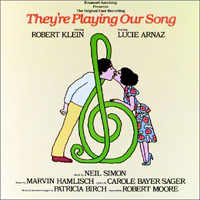 Original Broadway Cast, 1978 (Casablanca)
Original Broadway Cast, 1978 (Casablanca)  (2 / 5) Neil Simon based his book for They’re Playing Our Song on the real-life relationship of the show’s composer and lyricist, Marvin Hamlisch and Carole Bayer Sager. The result was a hit musical with catchy, pop-oriented tunes for the leading characters, Vernon and Sonia, and their alter egos — three boys for him, three girls for her. Robert Klein and Lucie Arnaz, who created the roles on Broadway, must have been better onstage than they are on this recording. Here, Klein is mannered and lacks a strong singing voice; his pseudo-pop sound doesn’t put the songs across. Arnaz’s vocals are scratchy and short on vulnerability. Still, the energy of this recording is unquestionable. Conductor Larry Blank and the back-up vocalists are first-rate. There is almost no dialogue to put the songs in context, but the score contains some solid numbers. Both Vernon’s and Sonia’s versions of the title song are witty, and they also have their own separate versions of the introspective “If He Really Knew Me.” “Fallin’ ” is presented as one of Vernon’s hit compositions, while the strong ballad “I Still Believe in Love” is his collaboration with Sonia. Another nice song of Sonia’s is “Just for Tonight.” — Jeffrey Dunn
(2 / 5) Neil Simon based his book for They’re Playing Our Song on the real-life relationship of the show’s composer and lyricist, Marvin Hamlisch and Carole Bayer Sager. The result was a hit musical with catchy, pop-oriented tunes for the leading characters, Vernon and Sonia, and their alter egos — three boys for him, three girls for her. Robert Klein and Lucie Arnaz, who created the roles on Broadway, must have been better onstage than they are on this recording. Here, Klein is mannered and lacks a strong singing voice; his pseudo-pop sound doesn’t put the songs across. Arnaz’s vocals are scratchy and short on vulnerability. Still, the energy of this recording is unquestionable. Conductor Larry Blank and the back-up vocalists are first-rate. There is almost no dialogue to put the songs in context, but the score contains some solid numbers. Both Vernon’s and Sonia’s versions of the title song are witty, and they also have their own separate versions of the introspective “If He Really Knew Me.” “Fallin’ ” is presented as one of Vernon’s hit compositions, while the strong ballad “I Still Believe in Love” is his collaboration with Sonia. Another nice song of Sonia’s is “Just for Tonight.” — Jeffrey Dunn
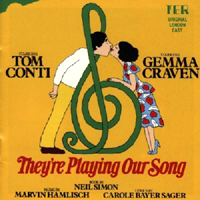 Original London Cast, 1980 (Chopper/TER-JAY)
Original London Cast, 1980 (Chopper/TER-JAY)  (4 / 5) It’s hard to define just why this recording is so far superior to the original. Tom Conti is primarily a non-musical actor, and Gemma Craven is better known as a soprano than a belter, but the two use all of their acting and vocal abilities to create fully realized characters. So, even though the London recording contains no more dialogue than the Broadway album, it’s far more theatrical. Conti immediately captures us with his touching performance of “Fallin’.” He and Craven deliver their respective versions of the title song with wonderful abandon, and the fact that their sensitive performances of “If He/She Really Knew Me” are programmed on the album as they are in the show only enhances their impact. Especially noteworthy here is the performance of “I Still Believe in Love”; this is supposedly the last song that Vernon and Sonia wrote before their breakup, and you can really hear that in Craven’s voice. The six alter egos are fine, and the orchestra sounds very good, but Craven and Conti are what make this disc spin. — J.D.
(4 / 5) It’s hard to define just why this recording is so far superior to the original. Tom Conti is primarily a non-musical actor, and Gemma Craven is better known as a soprano than a belter, but the two use all of their acting and vocal abilities to create fully realized characters. So, even though the London recording contains no more dialogue than the Broadway album, it’s far more theatrical. Conti immediately captures us with his touching performance of “Fallin’.” He and Craven deliver their respective versions of the title song with wonderful abandon, and the fact that their sensitive performances of “If He/She Really Knew Me” are programmed on the album as they are in the show only enhances their impact. Especially noteworthy here is the performance of “I Still Believe in Love”; this is supposedly the last song that Vernon and Sonia wrote before their breakup, and you can really hear that in Craven’s voice. The six alter egos are fine, and the orchestra sounds very good, but Craven and Conti are what make this disc spin. — J.D.
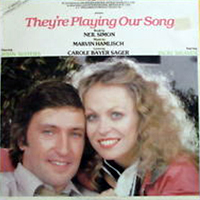 Original Australian Cast, 1980 (Festival Records)
Original Australian Cast, 1980 (Festival Records)  (2 / 5) They’re Playing Our Song became an international hit: Germany, Italy, Hungary, Austria, Mexico, Holland, and Australia all found the show to be a fine star vehicle, and some of those productions yielded cast albums with the score sung in languages other than English. Down Under, Vernon and Sonia were played by John Waters (an Australian film actor, not the American film director!) and Jacki Weaver (an Aussie TV star). Neither of them is an accomplished vocalist, but both are excellent actors, and their charms do come across on this recording. The alter egos here are very strong singers, perhaps to compensate for the fact that the leads are not. Overall, the performance is spirited and more than pleasant. — J.D.
(2 / 5) They’re Playing Our Song became an international hit: Germany, Italy, Hungary, Austria, Mexico, Holland, and Australia all found the show to be a fine star vehicle, and some of those productions yielded cast albums with the score sung in languages other than English. Down Under, Vernon and Sonia were played by John Waters (an Australian film actor, not the American film director!) and Jacki Weaver (an Aussie TV star). Neither of them is an accomplished vocalist, but both are excellent actors, and their charms do come across on this recording. The alter egos here are very strong singers, perhaps to compensate for the fact that the leads are not. Overall, the performance is spirited and more than pleasant. — J.D.
Texas, L’il Darlin’
 Original Broadway Cast, 1949 (Decca)
Original Broadway Cast, 1949 (Decca)  (3 / 5) Although it is now forgotten, this mild satire on Texas politics ran out the season, and a near-hit song or two came out of its score by composer Robert Emmett Dolan and lyricist Johnny Mercer. Originally released on 78s that preserved only about half of the score, the Texas Li’l Darlin’ cast album is a delectable time warp, transporting listeners to a bustling Broadway that was the Hit Parade’s primary source. “A Month of Sundays” is as typical as a 1949 ballad can get, with a pleasant melody and an all-purpose Mercer lyric; but “Hootin’ Owl Trail” is a real rediscovery, an irresistible easy-listener. So is “Affable, Balding Me,” a duet for Mary Hatcher, a spirited ingenue with a sweet soprano, and her suitor Fredd Wayne, who woos her with lyrics from Mercer’s top drawer. The lyrics of “Politics” are just as wonderful, filled with infectious rhymes such as “sonnets,” “bluebonnets,” and “Kostelanetz.” The no-name cast does very well with the material, which is paired with songs from the soundtrack of the film You Can’t Run Away From It on Decca’s CD. — Marc Miller
(3 / 5) Although it is now forgotten, this mild satire on Texas politics ran out the season, and a near-hit song or two came out of its score by composer Robert Emmett Dolan and lyricist Johnny Mercer. Originally released on 78s that preserved only about half of the score, the Texas Li’l Darlin’ cast album is a delectable time warp, transporting listeners to a bustling Broadway that was the Hit Parade’s primary source. “A Month of Sundays” is as typical as a 1949 ballad can get, with a pleasant melody and an all-purpose Mercer lyric; but “Hootin’ Owl Trail” is a real rediscovery, an irresistible easy-listener. So is “Affable, Balding Me,” a duet for Mary Hatcher, a spirited ingenue with a sweet soprano, and her suitor Fredd Wayne, who woos her with lyrics from Mercer’s top drawer. The lyrics of “Politics” are just as wonderful, filled with infectious rhymes such as “sonnets,” “bluebonnets,” and “Kostelanetz.” The no-name cast does very well with the material, which is paired with songs from the soundtrack of the film You Can’t Run Away From It on Decca’s CD. — Marc Miller
Tenderloin
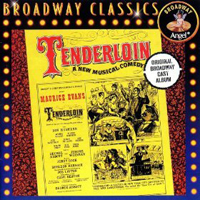 Original Broadway Cast, 1960 (Capitol/Angel)
Original Broadway Cast, 1960 (Capitol/Angel)  (4 / 5) It all starts with a marvelous opéra bouffe-style overture that sets the tone perfectly for this tale of the Tenderloin, New York’s most notorious neighborhood during the final decade of the 19th century. The area’s low-life denizens and a preacher determined to get rid of them are at the heart of the story, which unfolds excitingly through Jerry Bock’s music and Sheldon Harnick’s lyrics. From the rollicking “Little Old New York” and the wise “Reform,” sung by the ladies of the evening, to the luscious art song “Artificial Flowers” to the ragtime “Picture of Happiness” to some brilliantly constructed musical scenes, Tenderloin boasts one of the team’s top scores. The only problems with the original cast album are the two leading men: Maurice Evans gives a one-note performance as the preacher bent on banishing vice and corruption, and Ron Husmann as a scandal-sheet journalist has an arch singing style that displays no personality whatever. — Peter Filichia
(4 / 5) It all starts with a marvelous opéra bouffe-style overture that sets the tone perfectly for this tale of the Tenderloin, New York’s most notorious neighborhood during the final decade of the 19th century. The area’s low-life denizens and a preacher determined to get rid of them are at the heart of the story, which unfolds excitingly through Jerry Bock’s music and Sheldon Harnick’s lyrics. From the rollicking “Little Old New York” and the wise “Reform,” sung by the ladies of the evening, to the luscious art song “Artificial Flowers” to the ragtime “Picture of Happiness” to some brilliantly constructed musical scenes, Tenderloin boasts one of the team’s top scores. The only problems with the original cast album are the two leading men: Maurice Evans gives a one-note performance as the preacher bent on banishing vice and corruption, and Ron Husmann as a scandal-sheet journalist has an arch singing style that displays no personality whatever. — Peter Filichia
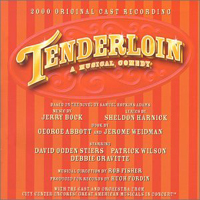 Encores! Concert Cast, 2000 (DRG)
Encores! Concert Cast, 2000 (DRG)  (5 / 5) This is one of the rare revival cast albums that’s better than the original. It offers crisper performances and sound, as though the singers had been recorded closer to the microphones. In the role of Tommy Howatt, Patrick Wilson has a much more freewheeling style than Ron Husmann, especially in “Picture of Happiness,” and a reprise of that terrific song adds to the fun of the recording. David Ogden Stiers comes across as a sincere preacher rather than the judgmental one portrayed by Maurice Evans of the Broadway cast. Another plus is the inclusion of introductory dialogue for many of the songs, none of which may be found on the original album. — P.F.
(5 / 5) This is one of the rare revival cast albums that’s better than the original. It offers crisper performances and sound, as though the singers had been recorded closer to the microphones. In the role of Tommy Howatt, Patrick Wilson has a much more freewheeling style than Ron Husmann, especially in “Picture of Happiness,” and a reprise of that terrific song adds to the fun of the recording. David Ogden Stiers comes across as a sincere preacher rather than the judgmental one portrayed by Maurice Evans of the Broadway cast. Another plus is the inclusion of introductory dialogue for many of the songs, none of which may be found on the original album. — P.F.
Tell Me More
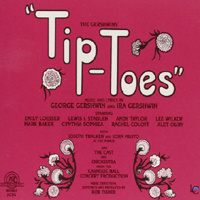 Studio Cast, 1998 (New World, 2CDs)
Studio Cast, 1998 (New World, 2CDs)  (3 / 5) This was one of the Gershwins’ middling, mid-1920s musicals, chock-a-block with mistaken identities, society marriages, and principal comics delivering numbers like “In Sardinia on the Delicatessen.” The Ira Gershwin-Buddy DeSylva lyrics are lighthearted and expert. With Tommy Krasker producing, Rob Fisher conducting, and Russell Warner orchestrating, George Gershwin’s melodies are in safe hands here, even if the orchestra of seven can’t capture the lush 1920s sound that’s called for. But the score is hardly the supreme achievement of the Gershwins in their Jazz Age phase; the outstanding numbers are “Kickin’ the Clouds Away” and the lilting “Love Is in the Air,” yet the hoped-for-hit ballad “Why Do I Love You?” sank so quickly that, two years later, Jerome Kern and Oscar Hammerstein could appropriate the title for one of their Show Boat songs with no fear of confusion. In a high-profile cast, comic-relief guy David Garrison is given more material than such roles usually command, and he’s terrific throughout. But stalwarts Christine Ebersole and Patrick Cassidy are underutilized, and the delectable Sally Mayes is out of synch with the casual vocal demeanor of flapper soubrettes. The young lovers, Diane Fratantoni and Philip Chaffin, don’t do much with the substandard Gershwin ballads, and even conductor Fisher seems to nod off a little in the ensembles. (Note: This two-CD set also includes the score of the Gershwins’ Tip-Toes, a more well known title and therefore the main focus of the recording.) — Marc Miller
(3 / 5) This was one of the Gershwins’ middling, mid-1920s musicals, chock-a-block with mistaken identities, society marriages, and principal comics delivering numbers like “In Sardinia on the Delicatessen.” The Ira Gershwin-Buddy DeSylva lyrics are lighthearted and expert. With Tommy Krasker producing, Rob Fisher conducting, and Russell Warner orchestrating, George Gershwin’s melodies are in safe hands here, even if the orchestra of seven can’t capture the lush 1920s sound that’s called for. But the score is hardly the supreme achievement of the Gershwins in their Jazz Age phase; the outstanding numbers are “Kickin’ the Clouds Away” and the lilting “Love Is in the Air,” yet the hoped-for-hit ballad “Why Do I Love You?” sank so quickly that, two years later, Jerome Kern and Oscar Hammerstein could appropriate the title for one of their Show Boat songs with no fear of confusion. In a high-profile cast, comic-relief guy David Garrison is given more material than such roles usually command, and he’s terrific throughout. But stalwarts Christine Ebersole and Patrick Cassidy are underutilized, and the delectable Sally Mayes is out of synch with the casual vocal demeanor of flapper soubrettes. The young lovers, Diane Fratantoni and Philip Chaffin, don’t do much with the substandard Gershwin ballads, and even conductor Fisher seems to nod off a little in the ensembles. (Note: This two-CD set also includes the score of the Gershwins’ Tip-Toes, a more well known title and therefore the main focus of the recording.) — Marc Miller
The Tap Dance Kid
 Original Broadway Cast, 1984 (Polygram)
Original Broadway Cast, 1984 (Polygram)  (2 / 5) Onstage, it was an entertaining, beautifully put together, old-fashioned show, but the cast album of The Tap Dance Kid reveals an uninteresting score. The musical’s strongest component is its book, written by long-time Broadway stage manager Charles Blackwell. The story centers on an upper-middle-class black family ruled by a tyrannical father (Samuel E. Wright) whose 10-year-old son, Willie (Alfonso Ribeiro), wants to be a tap dancer, following in the footsteps of his uncle (Hinton Battle). The lawyer-father’s adamant opposition to Willie’s career choice, plus other conflicts within the family involving the boy’s sympathetic mother and his outspoken older sister, drive the plot. The original cast members — those already named, plus Hattie Winston, Jackie Lowe, and Alan Weeks — give fine performances, and the songs, by composer Henry Krieger and lyricist Robert Lorick, help tell the story logically but without any particular inspiration. Here is an example of a musical whose sum is greater than its individual parts. — David Wolf
(2 / 5) Onstage, it was an entertaining, beautifully put together, old-fashioned show, but the cast album of The Tap Dance Kid reveals an uninteresting score. The musical’s strongest component is its book, written by long-time Broadway stage manager Charles Blackwell. The story centers on an upper-middle-class black family ruled by a tyrannical father (Samuel E. Wright) whose 10-year-old son, Willie (Alfonso Ribeiro), wants to be a tap dancer, following in the footsteps of his uncle (Hinton Battle). The lawyer-father’s adamant opposition to Willie’s career choice, plus other conflicts within the family involving the boy’s sympathetic mother and his outspoken older sister, drive the plot. The original cast members — those already named, plus Hattie Winston, Jackie Lowe, and Alan Weeks — give fine performances, and the songs, by composer Henry Krieger and lyricist Robert Lorick, help tell the story logically but without any particular inspiration. Here is an example of a musical whose sum is greater than its individual parts. — David Wolf
Tallulah
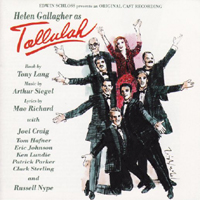 Original Off-Broadway Cast, 1983 (Painted Smiles)
Original Off-Broadway Cast, 1983 (Painted Smiles)  (1 / 5) One of the most colorful personalities in show business history, Tallulah Bankhead was so imitable that any impressionist worth his or her salt could evoke her with one growled “Dahhling!” Small wonder, then, that the musical Tallulah opens with a raft of male Bankheads going through the expected baritone-drawl motions. More surprising is the fact that the ambitious show, which ran briefly Off-Broadway, tried to be a full-scale biography of this magnetic and sometimes outrageous woman. Instead, it comes across as a sort of scrapbook-cum-A&E biography with songs that gaily (ahem!) skim the surface of Bankhead’s life without providing any real insight or substance. Arthur Siegel wrote a hummable score, and Mae Richard’s lyrics are generally serviceable, but the prime asset here is Helen Gallagher in the title role. A true musical comedy pro, she offers a decent imitation of Tallulah while singing far better than the real one ever could. (Oddly enough, Gallagher sings the curtain number, “I’m the Woman You Wanted,” in her own higher voice, not in Bankhead’s way-down tones.) Russell Nype appears to adequate effect as Tallulah’s senator father, and everyone works as hard as possible under the modest circumstances. But as Tallulah herself might have said, “There is less here than meets the eye.” — Richard Barrios
(1 / 5) One of the most colorful personalities in show business history, Tallulah Bankhead was so imitable that any impressionist worth his or her salt could evoke her with one growled “Dahhling!” Small wonder, then, that the musical Tallulah opens with a raft of male Bankheads going through the expected baritone-drawl motions. More surprising is the fact that the ambitious show, which ran briefly Off-Broadway, tried to be a full-scale biography of this magnetic and sometimes outrageous woman. Instead, it comes across as a sort of scrapbook-cum-A&E biography with songs that gaily (ahem!) skim the surface of Bankhead’s life without providing any real insight or substance. Arthur Siegel wrote a hummable score, and Mae Richard’s lyrics are generally serviceable, but the prime asset here is Helen Gallagher in the title role. A true musical comedy pro, she offers a decent imitation of Tallulah while singing far better than the real one ever could. (Oddly enough, Gallagher sings the curtain number, “I’m the Woman You Wanted,” in her own higher voice, not in Bankhead’s way-down tones.) Russell Nype appears to adequate effect as Tallulah’s senator father, and everyone works as hard as possible under the modest circumstances. But as Tallulah herself might have said, “There is less here than meets the eye.” — Richard Barrios
Taking My Turn
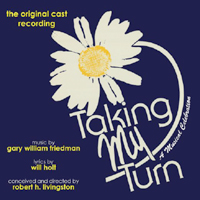 Original Off-Broadway Cast, 1983 (DRG)
Original Off-Broadway Cast, 1983 (DRG)  (4 / 5) This show managed only a brief run — not because there was anything wrong with the writing or the production, but perhaps because the general public didn’t think it wanted to see a musical about old people. Well, that was their loss: Taking My Turn is full of wonderful songs by composer Gary William Friedman and lyricist Will Holt. The show has no over-arching plot; it’s really a revue about various facets of the lives of seniors, from retirement to sex after 60, performed by an excellent cast. The famous 1940-’50s pop singer Margaret Whiting and film musical dubber extraordinaire Marni Nixon were still in terrific voice at the time of this show and the cast recording. Nixon shines in “Vivaldi,” about a nighttime concert in Central Park, while Whiting brings great depth of feeling to “In April,” a mother’s lament over the death of her son. The female company also includes Cissy Houston (mother of Whitney) and Sheila Smith (who had been seen on Broadway in such shows as Follies and Sugar). The men — Tiger Haynes, Victor Griffin, Mace Barrett, and Ted Thurston — are equally strong. — Michael Portantiere
(4 / 5) This show managed only a brief run — not because there was anything wrong with the writing or the production, but perhaps because the general public didn’t think it wanted to see a musical about old people. Well, that was their loss: Taking My Turn is full of wonderful songs by composer Gary William Friedman and lyricist Will Holt. The show has no over-arching plot; it’s really a revue about various facets of the lives of seniors, from retirement to sex after 60, performed by an excellent cast. The famous 1940-’50s pop singer Margaret Whiting and film musical dubber extraordinaire Marni Nixon were still in terrific voice at the time of this show and the cast recording. Nixon shines in “Vivaldi,” about a nighttime concert in Central Park, while Whiting brings great depth of feeling to “In April,” a mother’s lament over the death of her son. The female company also includes Cissy Houston (mother of Whitney) and Sheila Smith (who had been seen on Broadway in such shows as Follies and Sugar). The men — Tiger Haynes, Victor Griffin, Mace Barrett, and Ted Thurston — are equally strong. — Michael Portantiere
Taking a Chance on Love: The Lyrics & Life of John Latouche
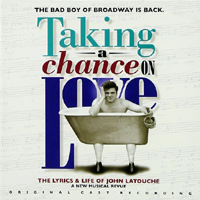 Original Off-Broadway Cast, 2000 (Original Cast)
Original Off-Broadway Cast, 2000 (Original Cast)  (5 / 5) This is a gilt-edged tribute to lyricist John Latouche, who wrote in a number of genres and had only occasional good fortune in any of them before dying at age 41. Latouche’s collaborators for musical theater scores were composers Vernon Duke (Cabin in the Sky), Jerome Moross (The Golden Apple), and Leonard Bernstein (Candide); with Douglas Moore, he wrote the opera The Ballad of Baby Doe. “Take Love Easy,” with music by Duke Ellington, is one of Latouche’s best songs that was not part of a show score. Spreading himself around and then dying young worked against Latouche being widely remembered; but this revue, lovingly put together by Erik Haagensen, goes a good distance toward documenting the gifted lyricist’s rightful place in musical theater history. The story of the man’s life, including his extensive homosexual experiences, is told between the songs, 18 of which were unrecorded until this cast album came along. Latouche’s work is sophisticated — for example, he rhymes “Oscar Levant’s room” with “Grant’s Tomb” in a song called “I’ll Take the City” — but can lean toward the rustic when appropriate, as in some songs from Cabin in the Sky. His biggest hit was surely “Taking a Chance on Love,” for which he collaborated with Ted Fetter on the lyrics. But some aficionados will point to “Lazy Afternoon” (from The Golden Apple), presented in the revue as a love song between Latouche and his late-in-life partner, Kenward Elmslie, as the pinnacle of his achievement. The cast, all of them up to all challenges, includes Eddie Korbich, Terry Burrell, Donna English, and Jerry Dixon. — David Finkle
(5 / 5) This is a gilt-edged tribute to lyricist John Latouche, who wrote in a number of genres and had only occasional good fortune in any of them before dying at age 41. Latouche’s collaborators for musical theater scores were composers Vernon Duke (Cabin in the Sky), Jerome Moross (The Golden Apple), and Leonard Bernstein (Candide); with Douglas Moore, he wrote the opera The Ballad of Baby Doe. “Take Love Easy,” with music by Duke Ellington, is one of Latouche’s best songs that was not part of a show score. Spreading himself around and then dying young worked against Latouche being widely remembered; but this revue, lovingly put together by Erik Haagensen, goes a good distance toward documenting the gifted lyricist’s rightful place in musical theater history. The story of the man’s life, including his extensive homosexual experiences, is told between the songs, 18 of which were unrecorded until this cast album came along. Latouche’s work is sophisticated — for example, he rhymes “Oscar Levant’s room” with “Grant’s Tomb” in a song called “I’ll Take the City” — but can lean toward the rustic when appropriate, as in some songs from Cabin in the Sky. His biggest hit was surely “Taking a Chance on Love,” for which he collaborated with Ted Fetter on the lyrics. But some aficionados will point to “Lazy Afternoon” (from The Golden Apple), presented in the revue as a love song between Latouche and his late-in-life partner, Kenward Elmslie, as the pinnacle of his achievement. The cast, all of them up to all challenges, includes Eddie Korbich, Terry Burrell, Donna English, and Jerry Dixon. — David Finkle
Take Me Along
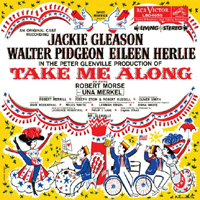 Original Broadway Cast, 1959 (RCA)
Original Broadway Cast, 1959 (RCA)  (4 / 5) Eugene O’Neill’s uncharacteristic comedy Ah, Wilderness! seemed a natural candidate for stage musical treatment — even though the MGM musical Summer Holiday, based on the same play, hadn’t been a big hit a decade earlier. Bob Merrill, who had skillfully turned O’Neill’s Anna Christie into the Gwen Verdon vehicle New Girl in Town, wrote the music and lyrics for Take Me Along, which David Merrick presented with a ticket-selling cast: Jackie Gleason (a huge TV star) as Uncle Sid; Walter Pidgeon (a Hollywood star in his Broadway musical debut) as Nat Miller; the well-known British actress Eileen Herlie as Lily; and former Hollywood soubrette Una Merkel as Essie Miller. Robert Morse, following up on his successes in The Matchmaker and Say, Darling, made a big splash in the juvenile role of Richard Miller. Take Me Along has all the elements of an old-fashioned show with a well-written score, and Lehman Engel’s musical direction is excellent throughout. Highlights include “I Would Die,” Morse’s duet with Susan Luckey as his beloved Muriel; “Staying Young,” Pidgeon’s hearty song about “today’s world” (1906); “I Get Embarrassed,” Gleason’s hilarious duet with Herlie, which is immediately followed by the latter’s loving, anticipatory “We’re Home”; and the vaudeville-inspired title song, with Gleason and Pidgeon stepping out in straw boaters and canes on their way to a Fourth of July picnic. One of the strongest numbers is the romantic ballad sung by young Richard, who can barely wait until “Nine O’Clock,” when his beloved will meet him. Listen to Morse here and you’ll get a very good idea of the innocence, charm, and heart that pervaded Broadway musicals of this era. — Jeffrey Dunn
(4 / 5) Eugene O’Neill’s uncharacteristic comedy Ah, Wilderness! seemed a natural candidate for stage musical treatment — even though the MGM musical Summer Holiday, based on the same play, hadn’t been a big hit a decade earlier. Bob Merrill, who had skillfully turned O’Neill’s Anna Christie into the Gwen Verdon vehicle New Girl in Town, wrote the music and lyrics for Take Me Along, which David Merrick presented with a ticket-selling cast: Jackie Gleason (a huge TV star) as Uncle Sid; Walter Pidgeon (a Hollywood star in his Broadway musical debut) as Nat Miller; the well-known British actress Eileen Herlie as Lily; and former Hollywood soubrette Una Merkel as Essie Miller. Robert Morse, following up on his successes in The Matchmaker and Say, Darling, made a big splash in the juvenile role of Richard Miller. Take Me Along has all the elements of an old-fashioned show with a well-written score, and Lehman Engel’s musical direction is excellent throughout. Highlights include “I Would Die,” Morse’s duet with Susan Luckey as his beloved Muriel; “Staying Young,” Pidgeon’s hearty song about “today’s world” (1906); “I Get Embarrassed,” Gleason’s hilarious duet with Herlie, which is immediately followed by the latter’s loving, anticipatory “We’re Home”; and the vaudeville-inspired title song, with Gleason and Pidgeon stepping out in straw boaters and canes on their way to a Fourth of July picnic. One of the strongest numbers is the romantic ballad sung by young Richard, who can barely wait until “Nine O’Clock,” when his beloved will meet him. Listen to Morse here and you’ll get a very good idea of the innocence, charm, and heart that pervaded Broadway musicals of this era. — Jeffrey Dunn
Taboo
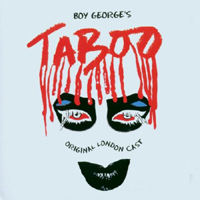 Original London Cast, 2003 (First Night)
Original London Cast, 2003 (First Night)  (2 / 5) Who would have imagined Boy George as a theater composer? Yet with this show, partly about George’s rise to fame in the London club scene of the early 1980s, that’s what the pop/rock star proved himself to be. As a bio-musical, what makes Taboo unusual is that its score does not consist exclusively of staples from an existing catalog. While one number from George’s Culture Club days, “Do You Really Want to Hurt Me?”, is included, the rest of the songs are original and surprisingly attractive, written by George in collaboration with John Themis, Kevan Frost, Richie Stevens, and others. “Stranger in This World” is a fine song for the young George, given an impressive vocal imitation by Euan Morton. “Guttersnipe” is performed by Morton with Mark McGee as the transvestite Marilyn, and “Love Is a Question Mark” is an insightful duet sung by Luke Evans and Dianne Pilkington. Yet the show lacks focus: It covers not only George’s ascent and subsequent fall from grace, but so many other lives and stories that we can’t latch onto anyone of them for very long. Among the people portrayed are performance artist Leigh Bowery (Matt Lewis and George himself share Bowery’s songs), nightclub promoter Philip Sallon (Paul Baker), and photographer Billy (Evans) and his troubled family (Gemma Craven and Mark White). — Matthew Murray
(2 / 5) Who would have imagined Boy George as a theater composer? Yet with this show, partly about George’s rise to fame in the London club scene of the early 1980s, that’s what the pop/rock star proved himself to be. As a bio-musical, what makes Taboo unusual is that its score does not consist exclusively of staples from an existing catalog. While one number from George’s Culture Club days, “Do You Really Want to Hurt Me?”, is included, the rest of the songs are original and surprisingly attractive, written by George in collaboration with John Themis, Kevan Frost, Richie Stevens, and others. “Stranger in This World” is a fine song for the young George, given an impressive vocal imitation by Euan Morton. “Guttersnipe” is performed by Morton with Mark McGee as the transvestite Marilyn, and “Love Is a Question Mark” is an insightful duet sung by Luke Evans and Dianne Pilkington. Yet the show lacks focus: It covers not only George’s ascent and subsequent fall from grace, but so many other lives and stories that we can’t latch onto anyone of them for very long. Among the people portrayed are performance artist Leigh Bowery (Matt Lewis and George himself share Bowery’s songs), nightclub promoter Philip Sallon (Paul Baker), and photographer Billy (Evans) and his troubled family (Gemma Craven and Mark White). — Matthew Murray
 Original Broadway Cast, 2004 (DRG)
Original Broadway Cast, 2004 (DRG)  (3 / 5) Financed and promoted by an enthusiastic Rosie O’Donnell, a revised version of Taboo came to Broadway but lasted there only a few months. As heard on this recording, the musical still suffers from problems in terms of its dramaturgy, despite librettist Charles Busch’s rewrite of Mark Davies’ original book to help clarify the story line. Musical theater veterans Raúl Esparza and Liz McCartney narrate the show as a flashback, and the peripheral characters are compressed into a central group, with the songs more skillfully divided among the principals. There are two holdovers from the London cast: Euan Morton, who sounds even better here as Boy George; and George himself, who’s effective if a bit stilted as Leigh Bowery. The fine supporting cast includes Sarah Uriarte Berry, Jeffrey Carlson, and Cary Shields. Among the highlights of this recording are Esparza’s songs, the decadent opening sequence “Freak”/”Ode to Attention Seekers” and the shattering “Petrified”; McCartney’s searing “Talk Amongst Yourselves”; Berry’s reflective “Il Adore”; Shields’ tumultuous “I See Through You”; and “Love Is a Question Mark,” a dueling quartet for Morton and Shields and George and Berry. There’s also an effective new finale, “Come On in From the Outside,” and gratuitous inclusions of the Culture Club standards “Church of the Poison Mind” and “Karma Chameleon.” Intelligently produced by John McDaniel and Kevan Frost, this recording is a significant improvement over the London cast album. — M.M.
(3 / 5) Financed and promoted by an enthusiastic Rosie O’Donnell, a revised version of Taboo came to Broadway but lasted there only a few months. As heard on this recording, the musical still suffers from problems in terms of its dramaturgy, despite librettist Charles Busch’s rewrite of Mark Davies’ original book to help clarify the story line. Musical theater veterans Raúl Esparza and Liz McCartney narrate the show as a flashback, and the peripheral characters are compressed into a central group, with the songs more skillfully divided among the principals. There are two holdovers from the London cast: Euan Morton, who sounds even better here as Boy George; and George himself, who’s effective if a bit stilted as Leigh Bowery. The fine supporting cast includes Sarah Uriarte Berry, Jeffrey Carlson, and Cary Shields. Among the highlights of this recording are Esparza’s songs, the decadent opening sequence “Freak”/”Ode to Attention Seekers” and the shattering “Petrified”; McCartney’s searing “Talk Amongst Yourselves”; Berry’s reflective “Il Adore”; Shields’ tumultuous “I See Through You”; and “Love Is a Question Mark,” a dueling quartet for Morton and Shields and George and Berry. There’s also an effective new finale, “Come On in From the Outside,” and gratuitous inclusions of the Culture Club standards “Church of the Poison Mind” and “Karma Chameleon.” Intelligently produced by John McDaniel and Kevan Frost, this recording is a significant improvement over the London cast album. — M.M.
Man With a Load of Mischief
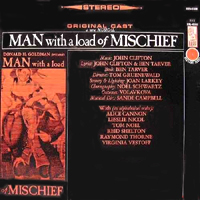 Original Off-Broadway Cast, 1966 (Kapp/no CD)
Original Off-Broadway Cast, 1966 (Kapp/no CD)  (4 / 5) For a tantalizing glimpse of the talent and creativity spawned Off-Broadway in happier times, seek out this 1966 hit, a Restoration-style comedy (though based on a minor 20th century play) that is by turns bawdy, witty, satirical, and as romantic as fine Madeira shared by the fire. It led observers to expect great things of composer-lyricist John Clifton (librettist Ben Tarver helped on the lyrics), whose melodies and harmonies are distinctive and alluring without straying too far from tradition. Sadly, one later Off-Broadway fiasco aside, Clifton’s subsequent work for the theater was minimal. That’s a pity, since vocal showpieces such as “Lover Lost,” “Goodbye, My Sweet,” and “Once You’ve Had a Little Taste” mark their composer as a natural musical storyteller with unfailing instincts as to which dramatic moments should be turned into song. On the cast album, Reid Shelton’s tenor sails easily above the staff in “Hulla-Baloo-Balay” and “Come to the Masquerade.” Virginia Vestoff acts as well as she sings in the title track and “A Wonder.” Raymond Thorne exudes patrician hauteur in “You’d Be Amazed” and “Forget!” The other three — Alice Cannon, Tom Noel, and Lesslie Nicol — are less skilled vocally, but well cast in their roles. This recording is long overdue for a digital transfer. — Marc Miller
(4 / 5) For a tantalizing glimpse of the talent and creativity spawned Off-Broadway in happier times, seek out this 1966 hit, a Restoration-style comedy (though based on a minor 20th century play) that is by turns bawdy, witty, satirical, and as romantic as fine Madeira shared by the fire. It led observers to expect great things of composer-lyricist John Clifton (librettist Ben Tarver helped on the lyrics), whose melodies and harmonies are distinctive and alluring without straying too far from tradition. Sadly, one later Off-Broadway fiasco aside, Clifton’s subsequent work for the theater was minimal. That’s a pity, since vocal showpieces such as “Lover Lost,” “Goodbye, My Sweet,” and “Once You’ve Had a Little Taste” mark their composer as a natural musical storyteller with unfailing instincts as to which dramatic moments should be turned into song. On the cast album, Reid Shelton’s tenor sails easily above the staff in “Hulla-Baloo-Balay” and “Come to the Masquerade.” Virginia Vestoff acts as well as she sings in the title track and “A Wonder.” Raymond Thorne exudes patrician hauteur in “You’d Be Amazed” and “Forget!” The other three — Alice Cannon, Tom Noel, and Lesslie Nicol — are less skilled vocally, but well cast in their roles. This recording is long overdue for a digital transfer. — Marc Miller
Swingtime Canteen
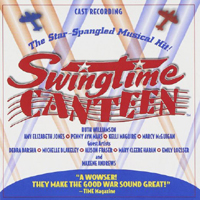 Studio Cast, 1997 (Performing Arts Preservation Assn.)
Studio Cast, 1997 (Performing Arts Preservation Assn.)  (3 / 5) When producer William Repicci caught a performance of a work in progress by Linda Thorsen Bond that was being staged in Midland, Texas, he was so impressed with the material that he recruited playwright Charles Busch to collaborate with him and Bond in refining the embryonic show. The result of their efforts is an all-female musical comedy set in London during World War II as a company of American singers, headed by an aging movie star, embarks on a U.S.O. tour of the battlefront. The Off-Broadway production of Swingtime Canteen, featuring Alison Fraser and Emily Loesser, had a nine-month run that included replacement stints by Busch — in drag, of course — playing the movie star, and a surviving Andrews sister, Maxene, playing herself. This recording features original cast members plus others — Ruth Williamson, Amy Elizabeth Jones, Penny Ayn Maas, and Kelli Maguire — from subsequent regional productions of the show. The voice of Maxene Andrews opens the recording and sets the scene. Others billed as “guest artists” include Mary Cleere Haran, who blends classic and contemporary styles in “I’m Old Fashioned” (Jerome Kern-Johnny Mercer); and Alison Fraser, who delivers “A Nightingale Sang in Berkeley Square” (Eric Maschwitz-Manning Sherwin) with exquisite simplicity. The album reaches its apex when Emily Loesser caresses “How High the Moon” (Morgan Lewis-Nancy Hamilton) with bluesy inflections. — Charles Wright
(3 / 5) When producer William Repicci caught a performance of a work in progress by Linda Thorsen Bond that was being staged in Midland, Texas, he was so impressed with the material that he recruited playwright Charles Busch to collaborate with him and Bond in refining the embryonic show. The result of their efforts is an all-female musical comedy set in London during World War II as a company of American singers, headed by an aging movie star, embarks on a U.S.O. tour of the battlefront. The Off-Broadway production of Swingtime Canteen, featuring Alison Fraser and Emily Loesser, had a nine-month run that included replacement stints by Busch — in drag, of course — playing the movie star, and a surviving Andrews sister, Maxene, playing herself. This recording features original cast members plus others — Ruth Williamson, Amy Elizabeth Jones, Penny Ayn Maas, and Kelli Maguire — from subsequent regional productions of the show. The voice of Maxene Andrews opens the recording and sets the scene. Others billed as “guest artists” include Mary Cleere Haran, who blends classic and contemporary styles in “I’m Old Fashioned” (Jerome Kern-Johnny Mercer); and Alison Fraser, who delivers “A Nightingale Sang in Berkeley Square” (Eric Maschwitz-Manning Sherwin) with exquisite simplicity. The album reaches its apex when Emily Loesser caresses “How High the Moon” (Morgan Lewis-Nancy Hamilton) with bluesy inflections. — Charles Wright
Swinging on a Star
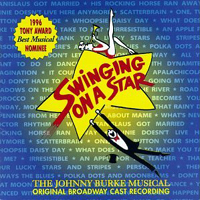 Original Broadway Cast, 1996 (After 9) No stars; not recommended. Subtitled “The Johnny Burke Musical,” this show tried to avoid being just another composer tribute revue by placing the songs of lyricist Burke within seven short vignettes of American life, ranging in time from the 1930s through the 1950s: a speakeasy sequence, a radio broadcast, a U.S.O. tour, and so on. Still, the net effect is that of an oldies songfest. Some items work better than others: Alvaleta Guess sings a sassy “Dr. Rhythm”; Lewis Cleale offers a heartfelt “Pennies From Heaven”; and Kathy Fitzgerald, Denise Faye, and Terry Burrell deliver a peppy “Personality.” But a lengthy tribute to the Hope-Crosby-Lamour “road”pictures is thoroughly lame, and overall, the recording comes across as a negligible collection of new performances of songs from vintage films. — David Barbour
Original Broadway Cast, 1996 (After 9) No stars; not recommended. Subtitled “The Johnny Burke Musical,” this show tried to avoid being just another composer tribute revue by placing the songs of lyricist Burke within seven short vignettes of American life, ranging in time from the 1930s through the 1950s: a speakeasy sequence, a radio broadcast, a U.S.O. tour, and so on. Still, the net effect is that of an oldies songfest. Some items work better than others: Alvaleta Guess sings a sassy “Dr. Rhythm”; Lewis Cleale offers a heartfelt “Pennies From Heaven”; and Kathy Fitzgerald, Denise Faye, and Terry Burrell deliver a peppy “Personality.” But a lengthy tribute to the Hope-Crosby-Lamour “road”pictures is thoroughly lame, and overall, the recording comes across as a negligible collection of new performances of songs from vintage films. — David Barbour
Swing!
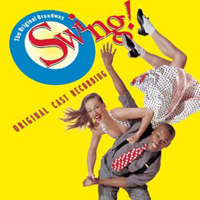 Original Broadway Cast, 1999 (Sony) No stars; not recommended. On Broadway, this revue’s main selling point was Lynne Taylor-Corbett’s ultra-strenuous choreography. What’s left on disc is a collection of mostly familiar swing tunes rendered with no particular distinction. If you feel the need to own another anthology of songs such as “It Don’t Mean a Thing (If It Ain’t Got That Swing),” “Boogie Woogie Bugle Boy,” and “Blues in the Night,” you might be interested, but be warned: Harold Wheeler’s orchestrations are surprisingly sedate. The recording does provide a showcase for top nightclub chanteuse Ann Hampton Callaway and rising Broadway ingenue Laura Benanti, but the former is heard to much better effect on her solo albums, and except for an effective rendition of “Cry Me a River,” the latter doesn’t really stand out here. — David Barbour
Original Broadway Cast, 1999 (Sony) No stars; not recommended. On Broadway, this revue’s main selling point was Lynne Taylor-Corbett’s ultra-strenuous choreography. What’s left on disc is a collection of mostly familiar swing tunes rendered with no particular distinction. If you feel the need to own another anthology of songs such as “It Don’t Mean a Thing (If It Ain’t Got That Swing),” “Boogie Woogie Bugle Boy,” and “Blues in the Night,” you might be interested, but be warned: Harold Wheeler’s orchestrations are surprisingly sedate. The recording does provide a showcase for top nightclub chanteuse Ann Hampton Callaway and rising Broadway ingenue Laura Benanti, but the former is heard to much better effect on her solo albums, and except for an effective rendition of “Cry Me a River,” the latter doesn’t really stand out here. — David Barbour
Sweet Smell of Success
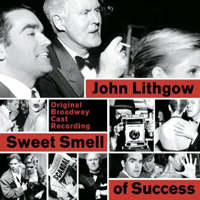 Original Broadway Cast, 2002 (Sony)
Original Broadway Cast, 2002 (Sony)  (3 / 5) With a book by John Guare, this musical based on the dark film Sweet Smell of Success found few fans during its three-month Broadway run, but the cast recording is very good and only seems to improve upon repeated listening. Composer Marvin Hamlisch and lyricist Craig Carnelia capture the essence of 1952 New York’s dark streets and smoky, neon-lit nightclubs, assisted by William David Brohn’s orchestrations, liberally peppered with brass licks, and Jeffrey Huard’s musical direction. When Hamlisch drags Carnelia into the Broadway underworld, the results are estimable: “The Column,” “Welcome to the Night,” and “Dirt” are terrific songs. The more jazz and pop-influenced numbers — “One Track Mind,” a solo tour-de-force sung by Jack Noseworthy as the musician Dallas, and “Don’t Know Where You Leave Off,” Noseworthy’s duet with strong-voiced ingenue Kelli O’Hara as his girlfriend — are also great, although some of the score’s more character-driven songs lack the daring of the other material. John Lithgow’s Tony Award-winning performance as the powerful and ruthless gossip columnist J.J. Hunsecker is represented only occasionally in song, but his hard-edged acting in what little of Guare’s bitterly humorous book is heard here makes up for the character’s lack of musical material and Lithgow’s vocal shortcomings. As the hungry press agent Sidney Falco, Brian d’Arcy James’ enthusiasm and stamina keep him flying high throughout — particularly in his early showcase number, “At the Fountain.” At 60 minutes in length, the recording is missing a fair amount of musical material; this fractures and muddies some sequences, breaking up the show’s continuity and making it sound more conventional than it was onstage. Still, overall, the album is a fine preservation of an underrated score. — Matthew Murray
(3 / 5) With a book by John Guare, this musical based on the dark film Sweet Smell of Success found few fans during its three-month Broadway run, but the cast recording is very good and only seems to improve upon repeated listening. Composer Marvin Hamlisch and lyricist Craig Carnelia capture the essence of 1952 New York’s dark streets and smoky, neon-lit nightclubs, assisted by William David Brohn’s orchestrations, liberally peppered with brass licks, and Jeffrey Huard’s musical direction. When Hamlisch drags Carnelia into the Broadway underworld, the results are estimable: “The Column,” “Welcome to the Night,” and “Dirt” are terrific songs. The more jazz and pop-influenced numbers — “One Track Mind,” a solo tour-de-force sung by Jack Noseworthy as the musician Dallas, and “Don’t Know Where You Leave Off,” Noseworthy’s duet with strong-voiced ingenue Kelli O’Hara as his girlfriend — are also great, although some of the score’s more character-driven songs lack the daring of the other material. John Lithgow’s Tony Award-winning performance as the powerful and ruthless gossip columnist J.J. Hunsecker is represented only occasionally in song, but his hard-edged acting in what little of Guare’s bitterly humorous book is heard here makes up for the character’s lack of musical material and Lithgow’s vocal shortcomings. As the hungry press agent Sidney Falco, Brian d’Arcy James’ enthusiasm and stamina keep him flying high throughout — particularly in his early showcase number, “At the Fountain.” At 60 minutes in length, the recording is missing a fair amount of musical material; this fractures and muddies some sequences, breaking up the show’s continuity and making it sound more conventional than it was onstage. Still, overall, the album is a fine preservation of an underrated score. — Matthew Murray
Sweet Charity
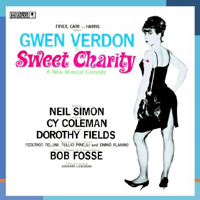 Original Broadway Cast, 1966 (Columbia)
Original Broadway Cast, 1966 (Columbia)  (5 / 5) This is a practically flawless recording of a Cy Coleman-Dorothy Fields score that ranks as one of the best of the 1960s. Bob Fosse’s adaptation of the Fellini film Nights of Cabiria starred Gwen Verdon in a beguiling, heartfelt performance as dance-hall girl Charity Hope Valentine. All of Verdon’s songs on the album are a pleasure, from the coy “You Should See Yourself” to the ecstatic “If My Friends Could See Me Now” and “I’m a Brass Band.” Her rendition of “Where Am I Going?” is heartbreaking; listen to her delivery of the final three words. Verdon finds all the warmth, humor, and vulnerability in Charity, selling the role from a vocal standpoint just as completely as she did with her world-class dancing onstage. The rest of the cast is also terrific: A full-voiced John McMartin sings the title song; Helen Gallagher and Thelma Oliver are equally effective in the big number “There’s Gotta Be Something Better Than This” and the much more intimate “Baby, Dream Your Dream”; James Luisi soars in the gorgeous “Too Many Tomorrows”; and the chorus women sex it up in the classic “Big Spender.” The musicians, playing Ralph Burns’ dynamite orchestrations, sound like the ultimate Broadway orchestra under Fred Werner’s musical direction; the overture and “The Rhythm of Life” will get your blood pumping and your feet tapping. The CD includes extended takes of “Rich Man’s Frug” and “I Love to Cry at Weddings,” opening-night interviews with Gallagher, Verdon, book writer Neil Simon, and celebrity guest Ethel Merman, and three great cuts of composer Coleman singing his songs with full accompaniment. — Matthew Murray
(5 / 5) This is a practically flawless recording of a Cy Coleman-Dorothy Fields score that ranks as one of the best of the 1960s. Bob Fosse’s adaptation of the Fellini film Nights of Cabiria starred Gwen Verdon in a beguiling, heartfelt performance as dance-hall girl Charity Hope Valentine. All of Verdon’s songs on the album are a pleasure, from the coy “You Should See Yourself” to the ecstatic “If My Friends Could See Me Now” and “I’m a Brass Band.” Her rendition of “Where Am I Going?” is heartbreaking; listen to her delivery of the final three words. Verdon finds all the warmth, humor, and vulnerability in Charity, selling the role from a vocal standpoint just as completely as she did with her world-class dancing onstage. The rest of the cast is also terrific: A full-voiced John McMartin sings the title song; Helen Gallagher and Thelma Oliver are equally effective in the big number “There’s Gotta Be Something Better Than This” and the much more intimate “Baby, Dream Your Dream”; James Luisi soars in the gorgeous “Too Many Tomorrows”; and the chorus women sex it up in the classic “Big Spender.” The musicians, playing Ralph Burns’ dynamite orchestrations, sound like the ultimate Broadway orchestra under Fred Werner’s musical direction; the overture and “The Rhythm of Life” will get your blood pumping and your feet tapping. The CD includes extended takes of “Rich Man’s Frug” and “I Love to Cry at Weddings,” opening-night interviews with Gallagher, Verdon, book writer Neil Simon, and celebrity guest Ethel Merman, and three great cuts of composer Coleman singing his songs with full accompaniment. — Matthew Murray
 Original London Cast, 1967 (CBS/Sony West End)
Original London Cast, 1967 (CBS/Sony West End)  (4 / 5) This second Sweet Charity is not quite perfect. The accents are a bit wonky. There are a number of internal cuts to the songs, and no “Charity’s Soliloquy” or “I’m the Greatest Individual.” The tempos and Ralph Burns’s gently revised orchestrations aren’t as sharp as on the Broadway recording. But, otherwise, this is a choice take on the material. As Charity, Juliet Prowse lacks the huggable personality and sleeve-worn vulnerability that made Gwen Verdon’s performance a treasure, but she stakes her claim to being the second best exponent of the role on record with gutsy renditions of the songs that squeeze every bit of dramatic juice from the character’s hard-bitten background. For that reason, she’s better in the sharper numbers (“You Should See Yourself,” “If My Friends Could See Me Now”) than the sweeter or darker stuff, but Prowse is a genuine pleasure in any event. So is pretty much everyone else, with Rod McLennan crooning well as Oscar, John Keston providing a rich “Too Many Tomorrows,” and Josephine Blake and Paula Kelly offering spirited backup as Charity’s dance-hall colleagues Nickie and Helene. The OBCR may be irreplaceable, but for a flavorful spin on the property before it started going downhill, this is as good as the runners-up get. — M.M.
(4 / 5) This second Sweet Charity is not quite perfect. The accents are a bit wonky. There are a number of internal cuts to the songs, and no “Charity’s Soliloquy” or “I’m the Greatest Individual.” The tempos and Ralph Burns’s gently revised orchestrations aren’t as sharp as on the Broadway recording. But, otherwise, this is a choice take on the material. As Charity, Juliet Prowse lacks the huggable personality and sleeve-worn vulnerability that made Gwen Verdon’s performance a treasure, but she stakes her claim to being the second best exponent of the role on record with gutsy renditions of the songs that squeeze every bit of dramatic juice from the character’s hard-bitten background. For that reason, she’s better in the sharper numbers (“You Should See Yourself,” “If My Friends Could See Me Now”) than the sweeter or darker stuff, but Prowse is a genuine pleasure in any event. So is pretty much everyone else, with Rod McLennan crooning well as Oscar, John Keston providing a rich “Too Many Tomorrows,” and Josephine Blake and Paula Kelly offering spirited backup as Charity’s dance-hall colleagues Nickie and Helene. The OBCR may be irreplaceable, but for a flavorful spin on the property before it started going downhill, this is as good as the runners-up get. — M.M.
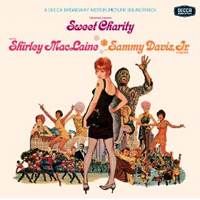 Film Soundtrack, 1969 (Decca)
Film Soundtrack, 1969 (Decca)  (2 / 5) Shirley MacLaine lacks much of Gwen Verdon’s conviction in the title role of Sweet Charity; she finds the character’s basic mood, but fails to offer distinctive vocal renditions of any of her numbers. The new songs written for the score by Cy Coleman and Dorothy Fields, “My Personal Property” and “It’s a Nice Face,” are not the equals of those they replaced. The audio quality of many of the tracks is poor, and slipshod editing prevents the soundtrack album from being an accurate record of what’s heard in the film. But some of the performances are excellent: Chita Rivera as a tough but Ioving Nickie, Sammy Davis, Jr. as a thoroughly magnetic “Big Daddy” in “The Rhythm of Life,” and a jovial Stubby Kaye as Herman in “I Love to Cry at Weddings.” John McMartin recreates his definitive Oscar, but he gets only one song here — a rewritten, less-exciting version of the title number. Joseph Gershenson supervises and conducts the music with verve, and, audio quality aside, the orchestra sounds great. — M.M.
(2 / 5) Shirley MacLaine lacks much of Gwen Verdon’s conviction in the title role of Sweet Charity; she finds the character’s basic mood, but fails to offer distinctive vocal renditions of any of her numbers. The new songs written for the score by Cy Coleman and Dorothy Fields, “My Personal Property” and “It’s a Nice Face,” are not the equals of those they replaced. The audio quality of many of the tracks is poor, and slipshod editing prevents the soundtrack album from being an accurate record of what’s heard in the film. But some of the performances are excellent: Chita Rivera as a tough but Ioving Nickie, Sammy Davis, Jr. as a thoroughly magnetic “Big Daddy” in “The Rhythm of Life,” and a jovial Stubby Kaye as Herman in “I Love to Cry at Weddings.” John McMartin recreates his definitive Oscar, but he gets only one song here — a rewritten, less-exciting version of the title number. Joseph Gershenson supervises and conducts the music with verve, and, audio quality aside, the orchestra sounds great. — M.M.
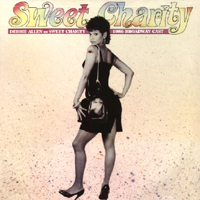 Broadway Cast, 1986 (EMI)
Broadway Cast, 1986 (EMI)  (1 / 5) What a step down, holy cow! You know you’re in trouble from the first seconds of this recording, when the musicians playing Ralph Burns’ orchestrations under Fred Werner’s baton lugubriously bleat out the opening salvos of the once-glorious Sweet Charity overture. Add in Debbie Allen’s self-indulgent performance as Charity, complete with overwrought vocal stylings (“I’m the Bravest Individual” is practically unlistenable), and the result is a misguided performance of the score with almost none of the thrills and charms to be found in other recordings. Only Michael Rupert as Oscar, Bebe Neuwirth as Nickie, and Mark Jacoby as Vittorio Vidal save the album from being a complete botch; Jacoby offers the best “Too Many Tomorrows” on record, and Rupert does a nice job with the film version of the title song. — M.M.
(1 / 5) What a step down, holy cow! You know you’re in trouble from the first seconds of this recording, when the musicians playing Ralph Burns’ orchestrations under Fred Werner’s baton lugubriously bleat out the opening salvos of the once-glorious Sweet Charity overture. Add in Debbie Allen’s self-indulgent performance as Charity, complete with overwrought vocal stylings (“I’m the Bravest Individual” is practically unlistenable), and the result is a misguided performance of the score with almost none of the thrills and charms to be found in other recordings. Only Michael Rupert as Oscar, Bebe Neuwirth as Nickie, and Mark Jacoby as Vittorio Vidal save the album from being a complete botch; Jacoby offers the best “Too Many Tomorrows” on record, and Rupert does a nice job with the film version of the title song. — M.M.
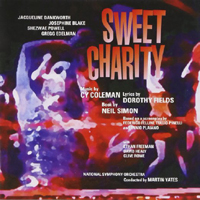 Studio Cast, 1995 (JAY, 2CDs)
Studio Cast, 1995 (JAY, 2CDs)  (2 / 5) The big benefit of this recording is its completeness: Every musical number from both the stage and film versions of Sweet Charity can be found here, plus all of the dance music. The downside is that conductor Martin Yates, leading the National Symphony Orchestra, slows down the tempi significantly. Jacqueline Dankworth is vocally the strongest Charity yet recorded, but she’s rather “hard,” failing to tap into the character’s vulnerability and starry-eyed resilience. She leads a mostly fine cast: Gregg Edelman as a smoothly sung Oscar, Clive Rowe as a wild “Big Daddy,” and Josephine Blake and Shezwae Powell as Nickie and Helene. Only David Healey’s Herman is surprisingly weak, making “I Love to Cry at Weddings” a skippable track. — M.M.
(2 / 5) The big benefit of this recording is its completeness: Every musical number from both the stage and film versions of Sweet Charity can be found here, plus all of the dance music. The downside is that conductor Martin Yates, leading the National Symphony Orchestra, slows down the tempi significantly. Jacqueline Dankworth is vocally the strongest Charity yet recorded, but she’s rather “hard,” failing to tap into the character’s vulnerability and starry-eyed resilience. She leads a mostly fine cast: Gregg Edelman as a smoothly sung Oscar, Clive Rowe as a wild “Big Daddy,” and Josephine Blake and Shezwae Powell as Nickie and Helene. Only David Healey’s Herman is surprisingly weak, making “I Love to Cry at Weddings” a skippable track. — M.M.
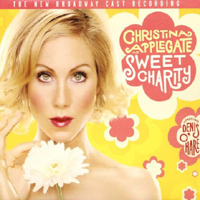 Broadway Cast, 2005 (DRG)
Broadway Cast, 2005 (DRG)  (2 / 5) An unapologetic star vehicle, Sweet Charity is only as good as its leading lady — who, in even the best of cases, will forever be compared to Gwen Verdon. Christina Applegate is a hard worker, and a trouper; during a nightmarish out-of-town tryout period, she sustained an injury that almost scuttled the production. But she is at best okay in the role, even on disc. With a thin voice and not a lot of verve, she can’t do much with the character, and not a single one of her renditions of the songs is memorable for any reason, good or bad. Denis O’Hare, cast almost dangerously to type as Oscar, displays his usual, hyper-neurotic stage persona. No one today does this kind of thing better, so his work is enjoyable (and he’s been given the rarely heard song “A Good Impression”) but not much different than in any other show. As Nickie and Helene, Janine LaManna and Kyra Da Costa come across very well. So does Paul Schoeffler as Vittorio, providing the closest this recording gets to a killer vocal with an emphatic “Too Many Tomorrows.” Substandard orchestrations by Don Sebesky, who cut down Ralph Burns’s peerless original charts, wrap the package. All of that said, with the exception of a funkified version of “The Rhythm of Life” that represents a painful, pitiful reinterpretation of the show-stopping real deal, most of the numbers still charm and amuse. The dazzling bonus tracks feature performances of several songs from the score by Cy Coleman and, on “I’m the Bravest Individual,” Dorothy Fields as well. These tracks in themselves arguably make this album necessary for completists. —M.M.
(2 / 5) An unapologetic star vehicle, Sweet Charity is only as good as its leading lady — who, in even the best of cases, will forever be compared to Gwen Verdon. Christina Applegate is a hard worker, and a trouper; during a nightmarish out-of-town tryout period, she sustained an injury that almost scuttled the production. But she is at best okay in the role, even on disc. With a thin voice and not a lot of verve, she can’t do much with the character, and not a single one of her renditions of the songs is memorable for any reason, good or bad. Denis O’Hare, cast almost dangerously to type as Oscar, displays his usual, hyper-neurotic stage persona. No one today does this kind of thing better, so his work is enjoyable (and he’s been given the rarely heard song “A Good Impression”) but not much different than in any other show. As Nickie and Helene, Janine LaManna and Kyra Da Costa come across very well. So does Paul Schoeffler as Vittorio, providing the closest this recording gets to a killer vocal with an emphatic “Too Many Tomorrows.” Substandard orchestrations by Don Sebesky, who cut down Ralph Burns’s peerless original charts, wrap the package. All of that said, with the exception of a funkified version of “The Rhythm of Life” that represents a painful, pitiful reinterpretation of the show-stopping real deal, most of the numbers still charm and amuse. The dazzling bonus tracks feature performances of several songs from the score by Cy Coleman and, on “I’m the Bravest Individual,” Dorothy Fields as well. These tracks in themselves arguably make this album necessary for completists. —M.M.
Sweeney Todd
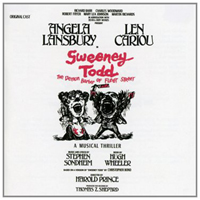 Original Broadway Cast, 1978 (RCA, 2CDs)
Original Broadway Cast, 1978 (RCA, 2CDs)  (5 / 5) Every musical theatre fan has a personal favorite Sondheim score, and the man’s oeuvre is so rich and diverse that it’s impossible to argue what is truly his “best” work. But few people if any would dispute that Sweeney Todd, the Demon Barber of Fleet Street is Sondheim’s grandest, largest-scale achievement. It’s also perhaps the work he’s most closely associated with, having achieved high-profile status in theaters and opera houses around the world, as well as having served as the basis for a popular film version. Adapted from the play by Christopher Bond, which in turn is a dramatic interpretation of an English urban legend, Sweeney Todd tells of a barber who slits the throats of his customers and consigns their dead bodies to his landlady, Mrs. Lovett, who bakes them into meat pies. The show is billed as “a musical thriller,” but Sondheim and book writer Hugh Wheeler focus on its themes of revenge, corruption, and obsession, adding more complex elements of humanity to the musical horror. That approach clearly worked, as Sweeney Todd is widely acknowledged as a musical theater masterpiece. The original Broadway cast recording remains definitive; it represents nearly the entire score and book of the show, and it’s thrilling from start to finish. As the vengeful barber, Len Cariou is sexy, sympathetic, and terrifying all at once. He’s superbly partnered by Angela Lansbury, providing comedic relief and giving a career-defining performance as Mrs. Lovett. The duo’s incredible chemistry comes to a high point with the famous Act 1 finale “A Little Priest,” when Sweeney and Lovett suddenly realize how to discard the remains of his victims as well as provide Mrs. L. with quality meat for her pies; Cariou and Lansbury fiendishly toy with Sondheim’s brilliant lyrics, making the song simultaneously hilarious and disturbing. The two are given excellent support by the rest of the principal company: Merle Louise’s demented Beggar Woman, Ken Jennings’ doe-eyed Tobias, Edmund Lyndeck’s lecherous Judge Turpin, and Sarah Rice and Victor Garber as the innocent lovers Johanna and Anthony are all perfect. Jonathan Tunick’s grandly operatic orchestrations have never been equaled, and Paul Gemignani conducts with a fearless, steady hand that keeps the entire piece moving seamlessly. There will always be room for differences of opinion as to what score represents the very best of Sondheim, but when it comes to Sweeney Todd, only one recording is truly essential: this one. — Matt Koplik
(5 / 5) Every musical theatre fan has a personal favorite Sondheim score, and the man’s oeuvre is so rich and diverse that it’s impossible to argue what is truly his “best” work. But few people if any would dispute that Sweeney Todd, the Demon Barber of Fleet Street is Sondheim’s grandest, largest-scale achievement. It’s also perhaps the work he’s most closely associated with, having achieved high-profile status in theaters and opera houses around the world, as well as having served as the basis for a popular film version. Adapted from the play by Christopher Bond, which in turn is a dramatic interpretation of an English urban legend, Sweeney Todd tells of a barber who slits the throats of his customers and consigns their dead bodies to his landlady, Mrs. Lovett, who bakes them into meat pies. The show is billed as “a musical thriller,” but Sondheim and book writer Hugh Wheeler focus on its themes of revenge, corruption, and obsession, adding more complex elements of humanity to the musical horror. That approach clearly worked, as Sweeney Todd is widely acknowledged as a musical theater masterpiece. The original Broadway cast recording remains definitive; it represents nearly the entire score and book of the show, and it’s thrilling from start to finish. As the vengeful barber, Len Cariou is sexy, sympathetic, and terrifying all at once. He’s superbly partnered by Angela Lansbury, providing comedic relief and giving a career-defining performance as Mrs. Lovett. The duo’s incredible chemistry comes to a high point with the famous Act 1 finale “A Little Priest,” when Sweeney and Lovett suddenly realize how to discard the remains of his victims as well as provide Mrs. L. with quality meat for her pies; Cariou and Lansbury fiendishly toy with Sondheim’s brilliant lyrics, making the song simultaneously hilarious and disturbing. The two are given excellent support by the rest of the principal company: Merle Louise’s demented Beggar Woman, Ken Jennings’ doe-eyed Tobias, Edmund Lyndeck’s lecherous Judge Turpin, and Sarah Rice and Victor Garber as the innocent lovers Johanna and Anthony are all perfect. Jonathan Tunick’s grandly operatic orchestrations have never been equaled, and Paul Gemignani conducts with a fearless, steady hand that keeps the entire piece moving seamlessly. There will always be room for differences of opinion as to what score represents the very best of Sondheim, but when it comes to Sweeney Todd, only one recording is truly essential: this one. — Matt Koplik
 New York Philharmonic Concert Cast, 2000 (N.Y. Philharmonic Special Editions, 2CDs)
New York Philharmonic Concert Cast, 2000 (N.Y. Philharmonic Special Editions, 2CDs)  (3 / 5) Now, assuming that you’ve done your homework, purchased the original cast album of Sweeney Todd, and thoroughly familiarized yourself with it, you can start enjoying other interpretations. In May of 2000, Lonny Price directed a semi-staged concert version of Sweeney for the New York Philharmonic in honor of Sondheim’s 70th birthday, and a live recording of the event was issued in a special limited edition. With a starry cast, an audibly thrilled audience, and the incomparable Philharmonic playing the score with searing focus, there’s a palpable energy to this performance; the applause that greets stars George Hearn and Patti LuPone upon their entrances and the knowing laughter that punches every line of “A Little Priest” are just a few examples. And yet, the heady, almost giddy atmosphere keeps this recording from ever truly soaring to great heights. While LuPone and Hearn are vocally peerless and blend together sensationally in “My Friends” and “Priest,” they both have a habit of indulging the audience rather than mining their characters for full dramatic potential. (LuPone provided a more well-defined Mrs. Lovett five years later in John Doyle’s stripped down revival; see review below). Neil Patrick Harris is an endearing if somewhat vocally underwhelming Tobias; Heidi Grant Murphy is a lovely Johanna, second only to Sarah Rice; and Audra McDonald is, of course, fantastic as the Beggar Woman. This may not be the most moving or compelling Sweeney Todd you’ll ever hear, but it’s pretty exciting. — M.K.
(3 / 5) Now, assuming that you’ve done your homework, purchased the original cast album of Sweeney Todd, and thoroughly familiarized yourself with it, you can start enjoying other interpretations. In May of 2000, Lonny Price directed a semi-staged concert version of Sweeney for the New York Philharmonic in honor of Sondheim’s 70th birthday, and a live recording of the event was issued in a special limited edition. With a starry cast, an audibly thrilled audience, and the incomparable Philharmonic playing the score with searing focus, there’s a palpable energy to this performance; the applause that greets stars George Hearn and Patti LuPone upon their entrances and the knowing laughter that punches every line of “A Little Priest” are just a few examples. And yet, the heady, almost giddy atmosphere keeps this recording from ever truly soaring to great heights. While LuPone and Hearn are vocally peerless and blend together sensationally in “My Friends” and “Priest,” they both have a habit of indulging the audience rather than mining their characters for full dramatic potential. (LuPone provided a more well-defined Mrs. Lovett five years later in John Doyle’s stripped down revival; see review below). Neil Patrick Harris is an endearing if somewhat vocally underwhelming Tobias; Heidi Grant Murphy is a lovely Johanna, second only to Sarah Rice; and Audra McDonald is, of course, fantastic as the Beggar Woman. This may not be the most moving or compelling Sweeney Todd you’ll ever hear, but it’s pretty exciting. — M.K.
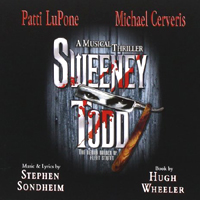 Broadway Cast, 2005 (Nonesuch, 2CDs)
Broadway Cast, 2005 (Nonesuch, 2CDs)  (4 / 5) When Sweeney was first revived on Broadway in 1990, at Circle-in-the-Square, that production (which yielded no cast album) was nicknamed “Teeny Todd” for its downsizing from the Grand Guignol style of the original production to a far more intimate affair, disposing of the chorus and large orchestra. Audiences were thrown by seeing and hearing the show performed on such a small scale after a decade of its having played in large theaters and opera houses. But even that staging couldn’t prepare Broadway for British director John Doyle’s re-conceptualized production 15 years later, set in an insane asylum. Doyle used only 10 actors and famously had them double as the orchestra throughout the show. The results are fascinating and, ultimately, rewarding; though the score loses its grandeur, the show becomes chillingly personal. The excellent cast/orchestra, led by Sondheim vets Michael Cerveris and Patti LuPone, glides through the score with assurance, each of them switching back and forth from actor to musician seamlessly. Cerveris makes for a particularly brooding Sweeney, and LuPone — more disciplined and restrained than in her New York Philharmonic performance (see review above) — is a sexy Mrs. Lovett. While everyone gets a chance to shine, the true star here is orchestrator Sarah Travis. Rather than reduce Jonathan Tunick’s original charts, Travis completely restyled Sondheim’s score to match the frightening intimacy of Doyle’s vision. Who knew that “Johanna” could sound so beautiful with only accordion and cello accompaniment? Even though “City on Fire” is sadly not included here, and some listeners may miss the impact of a large chorus, this is an excellent addition to the Sweeney discography and a wonderful opportunity for fans to hear a brilliant score in an entirely different way — M.K.
(4 / 5) When Sweeney was first revived on Broadway in 1990, at Circle-in-the-Square, that production (which yielded no cast album) was nicknamed “Teeny Todd” for its downsizing from the Grand Guignol style of the original production to a far more intimate affair, disposing of the chorus and large orchestra. Audiences were thrown by seeing and hearing the show performed on such a small scale after a decade of its having played in large theaters and opera houses. But even that staging couldn’t prepare Broadway for British director John Doyle’s re-conceptualized production 15 years later, set in an insane asylum. Doyle used only 10 actors and famously had them double as the orchestra throughout the show. The results are fascinating and, ultimately, rewarding; though the score loses its grandeur, the show becomes chillingly personal. The excellent cast/orchestra, led by Sondheim vets Michael Cerveris and Patti LuPone, glides through the score with assurance, each of them switching back and forth from actor to musician seamlessly. Cerveris makes for a particularly brooding Sweeney, and LuPone — more disciplined and restrained than in her New York Philharmonic performance (see review above) — is a sexy Mrs. Lovett. While everyone gets a chance to shine, the true star here is orchestrator Sarah Travis. Rather than reduce Jonathan Tunick’s original charts, Travis completely restyled Sondheim’s score to match the frightening intimacy of Doyle’s vision. Who knew that “Johanna” could sound so beautiful with only accordion and cello accompaniment? Even though “City on Fire” is sadly not included here, and some listeners may miss the impact of a large chorus, this is an excellent addition to the Sweeney discography and a wonderful opportunity for fans to hear a brilliant score in an entirely different way — M.K.
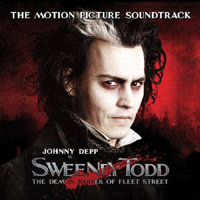 Film Soundtrack, 2007 (Nonesuch)
Film Soundtrack, 2007 (Nonesuch)  (2 / 5) Tim Burton’s film adaptation of Sweeney Todd is terrific or terrible, depending on whom you ask. Opting for a basically intimate film, Burton shied away from all things operatic, cutting any material that was sung by the chorus in the original score (“The Ballad of Sweeney Todd” and all of its reprises, for starters) and focusing solely on his principal cast. This makes for an arguably excellent film but a poor representation of the stage show and an uneven listening experience, as Burton’s approach works better for some sections of the score than others. The singing voices of the movie’s cast, led by Johnny Depp and Helena Bonham Carter, don’t allow them to revel in the lushness of Sondheim’s music. Without the film’s visuals, some listeners to the soundtrack may wonder why Carter whispers most of “The Worst Pies in London,” or why “Pirelli’s Miracle Elixir” is cut in half. Others may balk at Depp’s crooning, rock-tinged style of singing, less George Hearn and more David Bowie. Still, even without the benefit of seeing the film, this recording offers some perks. Broadway maestro Paul Gemignani leads a huge Hollywood orchestra that tears into the score with incredible intensity. (The orchestrations are Jonathan Tunick’s originals, with some changes of key and other minor alterations.) “Not While I’m Around” is sung beautifully by Ed Sanders, the first child actor to portray Tobias in a major production of Sweeney. The entire supporting cast is strong, with Laura Michelle Kelly making a memorable impression as the Beggar Woman even though Burton eliminated much of her role. — M.K.
(2 / 5) Tim Burton’s film adaptation of Sweeney Todd is terrific or terrible, depending on whom you ask. Opting for a basically intimate film, Burton shied away from all things operatic, cutting any material that was sung by the chorus in the original score (“The Ballad of Sweeney Todd” and all of its reprises, for starters) and focusing solely on his principal cast. This makes for an arguably excellent film but a poor representation of the stage show and an uneven listening experience, as Burton’s approach works better for some sections of the score than others. The singing voices of the movie’s cast, led by Johnny Depp and Helena Bonham Carter, don’t allow them to revel in the lushness of Sondheim’s music. Without the film’s visuals, some listeners to the soundtrack may wonder why Carter whispers most of “The Worst Pies in London,” or why “Pirelli’s Miracle Elixir” is cut in half. Others may balk at Depp’s crooning, rock-tinged style of singing, less George Hearn and more David Bowie. Still, even without the benefit of seeing the film, this recording offers some perks. Broadway maestro Paul Gemignani leads a huge Hollywood orchestra that tears into the score with incredible intensity. (The orchestrations are Jonathan Tunick’s originals, with some changes of key and other minor alterations.) “Not While I’m Around” is sung beautifully by Ed Sanders, the first child actor to portray Tobias in a major production of Sweeney. The entire supporting cast is strong, with Laura Michelle Kelly making a memorable impression as the Beggar Woman even though Burton eliminated much of her role. — M.K.
 London Cast, 2012 (First Night)
London Cast, 2012 (First Night)  (1 / 5) Premiering at the Chichester Festival Theatre in England, this revival of Sweeney Todd immediately transferred to the West End, where it enjoyed a very successful run and numerous accolades. While many, including Sondheim himself, have sung the production’s praises, and indeed it may have worked in the theater, this recording does very little to argue for its artistic merits. It doesn’t help that what we have here is really only a selection of highlights — although that isn’t how the album is labeled. Among the songs and sequences not included are “Poor Thing,” “Pirelli’s Miracle Elixir,” and “Green Finch and Linnet Bird.” These major omissions aside, there are other elements that make this recording nonessential. While the orchestra heard here is smallish, the orchestrations weren’t rewritten accordingly (as they were by Sarah Travis for the John Doyle production), but instead are just pared-down versions of the Jonathan Tunick originals. As a result, the score sounds tinny. On the plus side, the two critically acclaimed leads, Michael Ball and Imelda Staunton, provide fully realized performances as Sweeney and Mrs. Lovett. Though Ball’s voice is often too young-sounding and he therefore lacks a certain gravitas for the role, his “Epiphany” is strong, and Ball takes a note from Len Cariou in playing Sweeney with a restrained intensity throughout. Staunton is vocally on par with Lansbury, though her Lovett is more fiery and sinister, making her sparring with Ball on “A Little Priest” more frightening. Still, overall, this recording is the least satisfying of the stage cast albums reviewed here. — M.K.
(1 / 5) Premiering at the Chichester Festival Theatre in England, this revival of Sweeney Todd immediately transferred to the West End, where it enjoyed a very successful run and numerous accolades. While many, including Sondheim himself, have sung the production’s praises, and indeed it may have worked in the theater, this recording does very little to argue for its artistic merits. It doesn’t help that what we have here is really only a selection of highlights — although that isn’t how the album is labeled. Among the songs and sequences not included are “Poor Thing,” “Pirelli’s Miracle Elixir,” and “Green Finch and Linnet Bird.” These major omissions aside, there are other elements that make this recording nonessential. While the orchestra heard here is smallish, the orchestrations weren’t rewritten accordingly (as they were by Sarah Travis for the John Doyle production), but instead are just pared-down versions of the Jonathan Tunick originals. As a result, the score sounds tinny. On the plus side, the two critically acclaimed leads, Michael Ball and Imelda Staunton, provide fully realized performances as Sweeney and Mrs. Lovett. Though Ball’s voice is often too young-sounding and he therefore lacks a certain gravitas for the role, his “Epiphany” is strong, and Ball takes a note from Len Cariou in playing Sweeney with a restrained intensity throughout. Staunton is vocally on par with Lansbury, though her Lovett is more fiery and sinister, making her sparring with Ball on “A Little Priest” more frightening. Still, overall, this recording is the least satisfying of the stage cast albums reviewed here. — M.K.
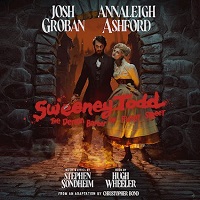 Broadway Cast, 2023 (Warner/Arts Music/Reprise)
Broadway Cast, 2023 (Warner/Arts Music/Reprise)  (3 / 5) No Broadway production of Sweeney Todd has aimed to match the scale of the 1979 original — until the 2023 revival that starred Josh Groban and Annaleigh Ashford. Like the production itself, the cast recording is a clean and respectful presentation of Sondheim’s masterpiece, but that respect and cleanliness constantly keeps the recording from reaching any dramatic heights. As Sweeney, the honey-voiced Groban sounds gorgeous on every song, especially in the more tender moments, such as “My Friends.” But Groban struggles to channel the rage and madness of the character, and so, for example, his “Epiphany” is healthily sung but lacking in chills. Ashford, meanwhile, brings plenty of humor and vocal sweetness to Mrs. Lovett but never gets to the messy ruthlessness lying beneath the character’s jokey surface. The much touted 26-piece orchestra sounds nice and lush playing the original orchestrations, but Alex Lacaimore’s courteous and often serene conducting keeps the musicians from truly ripping into Tunick’s charts. Also, while the recording is packed with strong singers besides Groban and Ashford, almost everyone sings with a modern sensibility and accents that clash with the classical tone of Sondheim’s score. Two notable exceptions are Jon Rapson and Nicholas Christopher, successfully campy as Beadle Bamford and Pirelli, respectively. Gaten Matarrazo is endearing as Tobias, and Ruthie Ann Miles’ Begger Woman brings a little bit of grit to the proceedings. While this recording isn’t much of a thrill, it still gives us a well-sung Sweeney, and is therefore enjoyable on that level. — M.K.
(3 / 5) No Broadway production of Sweeney Todd has aimed to match the scale of the 1979 original — until the 2023 revival that starred Josh Groban and Annaleigh Ashford. Like the production itself, the cast recording is a clean and respectful presentation of Sondheim’s masterpiece, but that respect and cleanliness constantly keeps the recording from reaching any dramatic heights. As Sweeney, the honey-voiced Groban sounds gorgeous on every song, especially in the more tender moments, such as “My Friends.” But Groban struggles to channel the rage and madness of the character, and so, for example, his “Epiphany” is healthily sung but lacking in chills. Ashford, meanwhile, brings plenty of humor and vocal sweetness to Mrs. Lovett but never gets to the messy ruthlessness lying beneath the character’s jokey surface. The much touted 26-piece orchestra sounds nice and lush playing the original orchestrations, but Alex Lacaimore’s courteous and often serene conducting keeps the musicians from truly ripping into Tunick’s charts. Also, while the recording is packed with strong singers besides Groban and Ashford, almost everyone sings with a modern sensibility and accents that clash with the classical tone of Sondheim’s score. Two notable exceptions are Jon Rapson and Nicholas Christopher, successfully campy as Beadle Bamford and Pirelli, respectively. Gaten Matarrazo is endearing as Tobias, and Ruthie Ann Miles’ Begger Woman brings a little bit of grit to the proceedings. While this recording isn’t much of a thrill, it still gives us a well-sung Sweeney, and is therefore enjoyable on that level. — M.K.
Sunset Boulevard
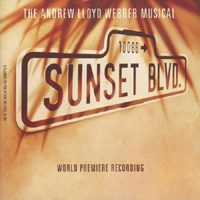 World Premiere Recording, 1993 (Polydor, 2CDs)
World Premiere Recording, 1993 (Polydor, 2CDs)  (3 / 5) Andrew Lloyd Webber heard a semi-operatic, sung-through musical in Billy Wilder’s 1950 melodrama film noir, but he made a mistake in choosing Don Black and Christopher Hampton to write the prosaic lyrics, overrun as they are with tiresome exposition set to the same few melody lines. Whatever may be said about the composer’s cribbing from Puccini and Rachmaninoff, when Lloyd Webber gets to the full-blown arias for Norma Desmond, he supplies steel-trap tunes: “With One Look,” “The Perfect Year,” and “As If We Never Said Goodbye” rank with his best. The world premiere production of Sunset Boulevard in London starred Patti LuPone, whose often-remarked-upon trouble with consonants is no problem here; on the contrary, her enunciation is impeccable, and her characterization fascinates. With her fluid reading of the songs and her delivery of what dialogue there is on the recording, LuPone presents the self-deluded Norma Desmond as someone who’s surrendered spontaneity to a magnificent artificiality. Her Norma is a defeated woman falling from a great height. Kevin Anderson sings and orates forcibly as Joe Gillis, the screenwriter supporting Desmond in her addled belief that she can make a return to film. Daniel Benzali is a sensitive Max, Madame’s butler and former husband; and Meredith Braun is fine as Betty Schaefer, the would-be screenwriter who falls for Joe. The sumptuous orchestrations by David Cullen and Lloyd Webber himself possess 1950s-film-soundtrack fervor. — David Finkle
(3 / 5) Andrew Lloyd Webber heard a semi-operatic, sung-through musical in Billy Wilder’s 1950 melodrama film noir, but he made a mistake in choosing Don Black and Christopher Hampton to write the prosaic lyrics, overrun as they are with tiresome exposition set to the same few melody lines. Whatever may be said about the composer’s cribbing from Puccini and Rachmaninoff, when Lloyd Webber gets to the full-blown arias for Norma Desmond, he supplies steel-trap tunes: “With One Look,” “The Perfect Year,” and “As If We Never Said Goodbye” rank with his best. The world premiere production of Sunset Boulevard in London starred Patti LuPone, whose often-remarked-upon trouble with consonants is no problem here; on the contrary, her enunciation is impeccable, and her characterization fascinates. With her fluid reading of the songs and her delivery of what dialogue there is on the recording, LuPone presents the self-deluded Norma Desmond as someone who’s surrendered spontaneity to a magnificent artificiality. Her Norma is a defeated woman falling from a great height. Kevin Anderson sings and orates forcibly as Joe Gillis, the screenwriter supporting Desmond in her addled belief that she can make a return to film. Daniel Benzali is a sensitive Max, Madame’s butler and former husband; and Meredith Braun is fine as Betty Schaefer, the would-be screenwriter who falls for Joe. The sumptuous orchestrations by David Cullen and Lloyd Webber himself possess 1950s-film-soundtrack fervor. — David Finkle
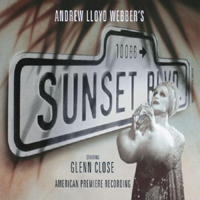 American Premiere Recording, 1994 (Polydor, 2CDs)
American Premiere Recording, 1994 (Polydor, 2CDs)  (2 / 5) Whereas Patti LuPone’s recorded performance as Norma Desmond in Sunset Boulevard may surpass what she accomplished onstage, Glenn Close, who played the role in Los Angeles and on Broadway, sounds crotchety and almost laughably desperate on this cast album. When speaking, Close comes across as an aging Ophelia. (The effect worked better live.) When singing the hothouse solos “With One Look” and “As If We Never Said Goodbye,” the star sometimes strides confidently into a note and disports herself much more vigorously than one might have expected, yet she does have problems in terms of range and volume . Too often, her shifting from chest voice to head voice and back again is the aural equivalent of watching a hurdler clear obstacles. Also, more than seems appropriate, much of her delivery sounds like whispering. Alan Campbell plays Joe Gillis and is more than adequate in his singing, yet not entirely convincing in the role. Judy Kuhn as Betty is, as always, lovely and real; what a lustrous voice she has. As Max, George Hearn adds another oddball performance to his list of Broadway oddballs. Musical director Paul Bogaev brings out all the overheated drama of Lloyd Webber’s melodies, which include a sweeping opening theme. — D.F.
(2 / 5) Whereas Patti LuPone’s recorded performance as Norma Desmond in Sunset Boulevard may surpass what she accomplished onstage, Glenn Close, who played the role in Los Angeles and on Broadway, sounds crotchety and almost laughably desperate on this cast album. When speaking, Close comes across as an aging Ophelia. (The effect worked better live.) When singing the hothouse solos “With One Look” and “As If We Never Said Goodbye,” the star sometimes strides confidently into a note and disports herself much more vigorously than one might have expected, yet she does have problems in terms of range and volume . Too often, her shifting from chest voice to head voice and back again is the aural equivalent of watching a hurdler clear obstacles. Also, more than seems appropriate, much of her delivery sounds like whispering. Alan Campbell plays Joe Gillis and is more than adequate in his singing, yet not entirely convincing in the role. Judy Kuhn as Betty is, as always, lovely and real; what a lustrous voice she has. As Max, George Hearn adds another oddball performance to his list of Broadway oddballs. Musical director Paul Bogaev brings out all the overheated drama of Lloyd Webber’s melodies, which include a sweeping opening theme. — D.F.
 Original Canadian Cast, 1995 (Polydor)
Original Canadian Cast, 1995 (Polydor)  (3 / 5) Diahann Carroll fans are the likeliest targets for this recording, which cuts out a good deal of material that may be heard on the two previous Sunset Boulevard albums. But what’s gone isn’t missed, since the show’s heavy-handed satire of Hollywood’s eat-’em-alive attitudes can become tedious. Carroll, an unexpected choice to play silent-screen-vamp Norma Desmond, gives a viable performance. Her Norma is full-bodied and commanding, and she brings interesting nuance to “New Ways to Dream” in particular. Rex Smith has an engaging way about him as Joe Gillis, Walter Charles lends depth to the loyal Max, Anita Louise Combe is a sweet Betty Schaefer, and Jeffrey Huard’s conducting is stately. — D.F.
(3 / 5) Diahann Carroll fans are the likeliest targets for this recording, which cuts out a good deal of material that may be heard on the two previous Sunset Boulevard albums. But what’s gone isn’t missed, since the show’s heavy-handed satire of Hollywood’s eat-’em-alive attitudes can become tedious. Carroll, an unexpected choice to play silent-screen-vamp Norma Desmond, gives a viable performance. Her Norma is full-bodied and commanding, and she brings interesting nuance to “New Ways to Dream” in particular. Rex Smith has an engaging way about him as Joe Gillis, Walter Charles lends depth to the loyal Max, Anita Louise Combe is a sweet Betty Schaefer, and Jeffrey Huard’s conducting is stately. — D.F.
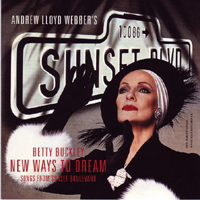 Betty Buckley: New Ways to Dream: Songs from Sunset Boulevard, 1995 (Polygram)
Betty Buckley: New Ways to Dream: Songs from Sunset Boulevard, 1995 (Polygram)  (3 / 5) When Betty Buckley replaced Glenn Close in the Broadway production of Sunset Boulevard, the show finally acquired its ideal Norma Desmond. From the first words that Buckley spoke — “You there! Why are you so late?” — the iron-butterfly quality of Desmond was suddenly, blazingly present in this dark musical’s speeches and songs. That opening comment is the only bit of dialogue Buckley speaks on this recording, which includes four of the character’s arias: “Surrender,” “With One Look,” “New Ways to Dream,” and “As If We Never Said Goodbye.” Still, what’s here is enough to confirm her mastery of the role. Alan Campbell makes a guest appearance as Joe Gillis, Paul Bogaev conducts, and their contributions here are superior to their previous recordings of this score. Buckley, it would seem, inspired them to rise to her vaunted level. — D.F.
(3 / 5) When Betty Buckley replaced Glenn Close in the Broadway production of Sunset Boulevard, the show finally acquired its ideal Norma Desmond. From the first words that Buckley spoke — “You there! Why are you so late?” — the iron-butterfly quality of Desmond was suddenly, blazingly present in this dark musical’s speeches and songs. That opening comment is the only bit of dialogue Buckley speaks on this recording, which includes four of the character’s arias: “Surrender,” “With One Look,” “New Ways to Dream,” and “As If We Never Said Goodbye.” Still, what’s here is enough to confirm her mastery of the role. Alan Campbell makes a guest appearance as Joe Gillis, Paul Bogaev conducts, and their contributions here are superior to their previous recordings of this score. Buckley, it would seem, inspired them to rise to her vaunted level. — D.F.
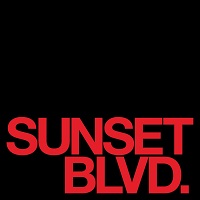 London Cast, 2024 (The Other Songs, 2CDs)
London Cast, 2024 (The Other Songs, 2CDs)  (3 / 5) Director Jamie Lloyd’s reimagining of Sunset Boulevard, seen first in London and later on Broadway, was a wholesale deconstruction of the musical, marked by an extensive use of live video projections as well as minimal-to-nonexistent sets (no grand staircase to be seen anywhere) and costumes (with the entirety of the cast in basic black, non-period garb). Recorded live and complete with dialogue on stage at London’s Savoy Theatre, this cast album reflects the aggressive minimalism of the production in that it contains no booklet and, therefore, no photos or notes on the show, its personnel, the score, etc.. For this reason — plus the facts that the original orchestrations are employed again here, and the singing of the cast is pretty much along traditional lines — the recording in and of itself gives no indication of the radical reinterpretation of the material, and may therefore be enjoyed even by audience members who hated the production as experienced on Broadway or in the West End. Central to such enjoyment will be Nicole Scherzinger’s bravura vocal performance in the role of the faded silent film star Norma Desmond — or, rather, a post-modern character loosely inspired by same. Scherzinger delivers Norma’s big arias magnificently in a way that highlights the inherent pop nature of the score, however inappropriate that style may be to the story. She is strongly supported by Tom Francis as a sexy, sympathetic Joe Gillis and David Thaxton as a sonorous, creepy Max von Mayerling, while Grace Hodgett Young is fine in the relatively thankless role of Betty Schaefer. Not surprisingly, the technical quality of the live recording is state-of-the-art and very satisfying. — Michael Portantiere
(3 / 5) Director Jamie Lloyd’s reimagining of Sunset Boulevard, seen first in London and later on Broadway, was a wholesale deconstruction of the musical, marked by an extensive use of live video projections as well as minimal-to-nonexistent sets (no grand staircase to be seen anywhere) and costumes (with the entirety of the cast in basic black, non-period garb). Recorded live and complete with dialogue on stage at London’s Savoy Theatre, this cast album reflects the aggressive minimalism of the production in that it contains no booklet and, therefore, no photos or notes on the show, its personnel, the score, etc.. For this reason — plus the facts that the original orchestrations are employed again here, and the singing of the cast is pretty much along traditional lines — the recording in and of itself gives no indication of the radical reinterpretation of the material, and may therefore be enjoyed even by audience members who hated the production as experienced on Broadway or in the West End. Central to such enjoyment will be Nicole Scherzinger’s bravura vocal performance in the role of the faded silent film star Norma Desmond — or, rather, a post-modern character loosely inspired by same. Scherzinger delivers Norma’s big arias magnificently in a way that highlights the inherent pop nature of the score, however inappropriate that style may be to the story. She is strongly supported by Tom Francis as a sexy, sympathetic Joe Gillis and David Thaxton as a sonorous, creepy Max von Mayerling, while Grace Hodgett Young is fine in the relatively thankless role of Betty Schaefer. Not surprisingly, the technical quality of the live recording is state-of-the-art and very satisfying. — Michael Portantiere
Sunset
 Original Off-Broadway Cast, 1990 (TER-JAY) No stars; not recommended. In 1978, a musical titled Platinum had an extremely brief run on Broadway. It starred the stylish Alexis Smith in the role of an aging movie star involved with a young rock singer. In 1983, a cut-down version of the show with four performers turned up Off-Broadway, retitled Sunset, and closed on opening night after 13 preview performances. This is the cast album of that version. With a libretto and lyrics by Will Holt and music by Gary William Friedman, Sunset concerns a straight male rock star named Danger Dan who wants to wear an old movie star’s red-beaded evening gown on his upcoming TV special. The saddest part of the whole enterprise is the waste of a talented cast: Ronnie Blakely, Kim Milford, Walt Hunter, and most significantly, Tammy Grimes in the central role. — David Wolf
Original Off-Broadway Cast, 1990 (TER-JAY) No stars; not recommended. In 1978, a musical titled Platinum had an extremely brief run on Broadway. It starred the stylish Alexis Smith in the role of an aging movie star involved with a young rock singer. In 1983, a cut-down version of the show with four performers turned up Off-Broadway, retitled Sunset, and closed on opening night after 13 preview performances. This is the cast album of that version. With a libretto and lyrics by Will Holt and music by Gary William Friedman, Sunset concerns a straight male rock star named Danger Dan who wants to wear an old movie star’s red-beaded evening gown on his upcoming TV special. The saddest part of the whole enterprise is the waste of a talented cast: Ronnie Blakely, Kim Milford, Walt Hunter, and most significantly, Tammy Grimes in the central role. — David Wolf

